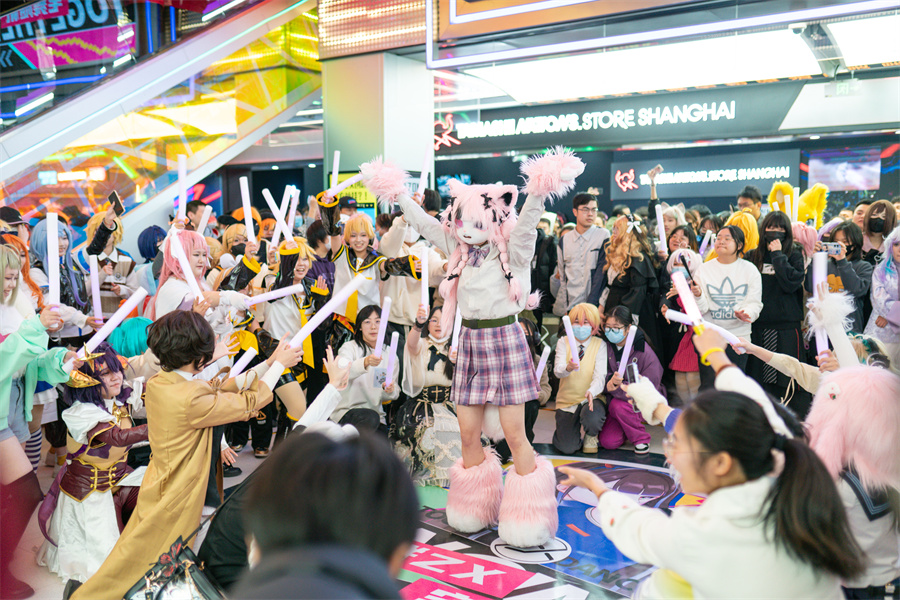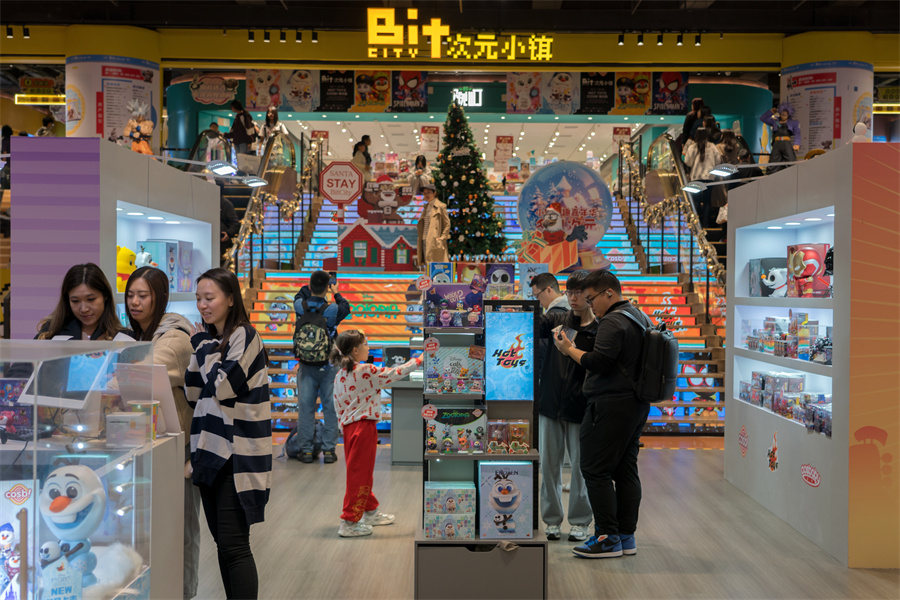
ACGN fans participate in a dancing event held by Bailian ZX creative center, a complex especially themed around the niche culture, in Shanghai this winter. [CHINA DAILY]
Over the past year, you might have wandered into a mall adorned with vibrant anime posters, stumbled upon stores packed with game figurines, or spotted products co-branded with virtual-world characters. At the heart of this growing phenomenon lies the buzzworthy "guzi economy", which is transforming retail and captivating a new generation of consumers.
The emerging buzzword "guzi", or goods, refers to merchandise created from copyrighted cultural works in domains such as anime, comic books, games and novels. The derivative products usually include posters, badges, cards, keychains, figurines, plush toys and more, and the act of purchasing guzi is known as "eating guzi" (chigu).
According to data from consultancy firm iiMedia Research, the market size of China's guzi economy soared to 168.9 billion yuan ($23.14 billion) in 2024 from 120.1 billion yuan in 2023, while the growth momentum is expected to continue, with a projected market size of over 308.9 billion yuan by 2029.
The guzi craze has extended offline, reshaping traditional retail landscapes. The involvement of guzi stores has become a popular strategy for traditional shopping malls to inject new momentum into offline sales, attract younger consumers and revitalizing their operations.
As the country's first commercial complex especially themed around ACGN culture, Shanghai's Bailian ZX creative center now witnesses over 90 percent of its memberships from Generation Z (those born between the mid-1990s and early 2000s) buyers.
Dubbed by ACGN fans as "China's Akihabara", a center of Japanese manga and anime culture, the mall has become not only a landmark for anime fans in Shanghai, but also "a gathering hub" for ACGN enthusiasts across the country, said Rebecca Chen, a 19-year-old guzi buyer.
"It has everything an ACGN culture fan could want, and also provides a platform for people of similar interests to bond and share," Chen said.
With an area of 10,000 square meters, Bailian ZX only houses over 40 stores. While few in number, the stores are predominantly focused on ACGN culture, offering a wide range of merchandise created from bountiful intellectual properties that ACGN culture encompasses.

A view of Synear Food's latest co-branded tangyuan (glutinous rice balls) in the shape of a popular video game Eggy Party character. [CHINA DAILY]
In 2023, Bailian ZX finished its renovation of the old Hualian commercial building, which once struggled to attract new tenants even on Shanghai's most bustling Nanjing Road due to sluggish offline attractions.
Sensing a rapid rise of younger consumer demographics and ACGN culture, the mall swiftly adjusted strategy and pivoted to this younger audience.
"From the day we began our operations, Bailian ZX has positioned itself as the mecca for China's ACGN culture," said Li Ling, general manager of Bailian ZX. "Our goal is to set a good example in the emerging sector and contribute when the country's offline ACGN businesses take shape."
Li added that by targeting only the ACGN and guzi culture, the mall's customer base is highly vertical, which allows even niche IPs to thrive and offers a platform for lesser-known works to reach their core fans and "make their voice heard", eventually leading to a supportive ecology for ACGN culture.
Since its reopening in January 2023, Bailian ZX has welcomed over 15 million visitors, earned 500 million yuan in revenue and hosted more than 700 events in the first 18 months.
The transformation of Bailian ZX is not alone. ACGN-themed stores and malls have emerged as a powerful booster to brick-and-mortar businesses around the nation. Shopping complexes such as Beijing's Huawei Building, BOM Xifanli, and The Box Chaowai, Shanghai's Metro City and Wuhan's Trend Box X118 have all introduced the new guzi business form into their space.
"In an era where e-commerce challenges physical retail, guzi stores have provided traditional shopping malls with an opportunity to regain foot traffic," said Shi Changzheng, a management executive at Huawei Building.
For example, the third floor of the shopping mall, where sit most ACGN and guzi stores, saw its sales double from January to July and also witnessed a significant increase in visitors, Shi added.
Data from corporate data provider Tianyancha show that over 10,000 new businesses related to the guzi economy were established between January and November 2024, up 14 percent year-on-year, bringing the existing total number to over 64,000.
Unwilling to fall behind in the ACGN trend, established domestic brands are also leveraging the new cultural elements for younger buyers with crossover products.
Synear Food Co Ltd, a Zhengzhou, Henan province-based frozen food company, released its co-branded tangyuan (glutinous rice balls) with NetEase Games' popular video game Eggy Party in December, with the round ball designs looking just like the game's cute characters. Touted by the game's fans, the products were sold out soon after launch on major e-commerce platforms such as JD.com and Tmall.
"In the past, tangyuan was primarily consumed during traditional festivals. This collaboration has expanded the consumption scenarios, offering a new choice for young consumers as everyday snacks and afternoon treats, and further boosting sales opportunities," said Song Jia, a senior executive at Synear Food.
As a 27-year-old traditional brand, Synear aims to rejuvenate its brand image through such co-branding, catering to Gen-Z's demand for differentiated tastes, Song added.
"As today's consumer needs are changing rapidly, we've been thinking about how to not only maintain our existing market share, but also achieve new growth in a continuously evolving landscape," Song said, adding that the company will continue to explore collaborations with ACGN culture IPs, combining traditional products with emerging cultural trends to attract more young consumers.
Similarly, Shanghai-based Laofengxiang, a time-honored jewelry brand, collaborated with Bandai Namco to release pure gold collectibles inspired by anime series Mobile Suit Gundam SEED.

Consumers shop at a guzi store in Shenzhen, Guangdong province, on Dec 28. [CHINA DAILY]
As the trend of hedging with gold products is increasingly appealing to younger consumers, the collaboration aims to further tap gold consumption growth among young people, while also helping the legacy brand engage in dialogue with the younger generations, said Li Minghao, deputy manager of the brand's marketing department.
As ACGN culture and guzi thrive on its wide-ranging reach across different merchandise forms, they can be seamlessly integrated into traditional retail, and are expected to help stimulate consumption with its strong consumer appeal, said Zhang Shule, an analyst in the culture and entertainment industry.
The rise of domestic IPs has also played a crucial role in fueling the guzi economy, Zhang said. Popular IPs such as classic NetEase Games' Onmyoji, Tencent Games' Honor of Kings, and new hits like MiHoYo's Genshin Impact, Tencent Games' Light and Night, and Game Science's Black Myth: Wukong have all cultivated dedicated fanbases, driving huge domestic demand for related merchandise, he added.
"The core strength of the guzi economy lies in strong IPs capable of creating shared cultural experiences," said Sun Jiashan, an associate researcher at the Central Academy of Culture and Tourism Administration. "These experiences can help fulfill one's psychological need for companionship, especially among younger consumers."
Sun added the guzi economy represents more than material consumption — it also reflects a shift among young consumers toward spiritual and cultural fulfillment.
"The consumption of guzi also has a social dimension, with ACGN fans finding a sense of connection through their purchases," Sun said.
"Chigu makes the happiness derived from ACGN culture works tangible. These items evoke real emotions and memories of the characters they represent," said Li Zeyu, a guzi enthusiast.
Data from an iiMedia Research report show that the pan-ACGN user base in China has grown significantly during recent years, from 354 million in 2019 to 503 million in 2024, and is likely to reach 570 million by 2029. The expanding demographic is believed to further drive relevant demand and help gradually shape a new economic form, it said.
While the guzi economy opens up vast opportunities for consumption and business innovation, it also requires effective regulation to mitigate potential negative impacts, particularly on younger audiences, Sun added.
"Proper guidance can help ACGN culture guide positive values and contribute to the healthy development of China's cultural industries," he said.